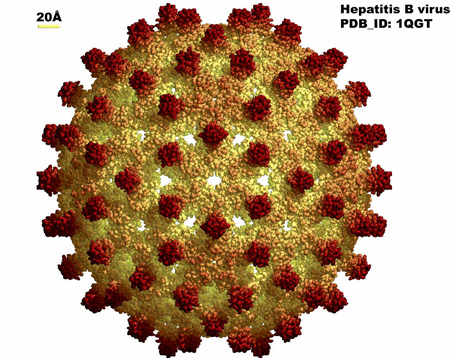Hepatitis B

Hepatitis B is a virus that causes a liver infection. 90% of people who contract the virus recover within six months while the other 10% become chronic carriers (Public Health Canada, 2012). Hepatitis B is the most serious form of viral hepatitis as it can be the origin of chronic liver disease and places people at elevated risks of death due to cancer or cirrhosis of the liver (WHO, 2012). Hepatitis B is made up of deoxyribonucleic acids and belongs to the Hepadnaviridae family of viruses (MedicineNet, 2012). The majority of the damage caused by this virus takes place because your body detects the infection and sends out special antibodies to fight it. Unfortunately, these special cells often causes liver inflammation (PubMed Health, 2012).
How Can You Get Hepatitis B?
There are a number of ways that this virus can be contracted but the virus is transferred primarily through blood, semen, and vaginal fluids. You can contract Hepatitis B through a blood transfusion, direct contact with blood in any setting, sharing drug needles, contaminated tattoo or acupuncture needles/equipment, unsafe sex with an infected person, or by sharing personal items (like nail clippers, toothbrushes, or razors) with an infected person. The virus can also be passed from infected mother to child (PubMed Health, 2012). If you are on hemodialysis or are infected with HIV, this can increase your risk of contracting Hepatitis B (PubMed Health, 2012).
Hepatitis B Facts
Prevention
The easiest way to protect yourself against contracting Hepatitis B is to get the vaccine for it (Public Health Canada, 2012). The vaccine is given in three to four separate doses and is expected to last for up to 20 years (WHO, 2012). Be sure to follow up with your health care professional about your vaccination status. Other ways to be conscious of the transmission of Hepatitis B and prevent infection include:
- Practice safe sex
- Ensure proper screenings of all sexual partners
- Avoid sharing personal items like toothbrushes, nail clippers, or razors
- Refrain from sharing drug needles or other drug paraphernalia (straws for snorting, etc)
- If cleaning up blood, use a solution that includes 1 part bleach to 10 parts water (PubMed Health, 2012)
Article References
eMedicine. (2012). Hepatitis B. Retrieved 04 12, 2012, from eMedicine Health: http://www.emedicinehealth.com/hepatitis_b/page3_em.htm
MedicineNet. (2012). Hepatitis B (HBV). Retrieved 04 12, 2012, from Medicine Net: http://www.medicinenet.com/hepatitis_b/article.htm
Public Health Canada. (2012). Hepatitis B - Get the Facts. Retrieved 04 12, 2012, from Public Health Agency of Canada: http://www.phac-aspc.gc.ca/hcai-iamss/bbp-pts/hepatitis/hep_b-eng.php
PubMed Health. (2012). Hepatitis B. Retrieved 04 12, 2012, from PubMed Health: http://www.ncbi.nlm.nih.gov/pubmedhealth/PMH0001324/
WHO. (2012). Hepatitis B. Retrieved 04 12, 2012, from World Health Organization: http://www.who.int/mediacentre/factsheets/fs204/en/
Image References
Someone else's art deserves recognition! The images presented in this article were borrowed from the following places:
Header Image: http://cache2.artprintimages.com/lrg/30/3040/V9PBF00Z.jpg | Retrieved May 16, 2012
Image 1: http://www.virology.wisc.edu/virusworld/ICTV8/hpb-hepatitis-b-ictv8.jpg | Retrieved May 1, 2015